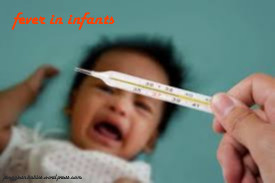Fever in infants

Parents especially mothers always get anxious when their baby develops a fever , it is quite normal to be anxious. However, having a fever does not mean your baby has a serious infection. Your baby can have an elevated body temperature due to response to an infection, as a result of overdressing your baby or can occur after an immunization(even adults react to immunizations). Fever is when the body temperature is found to be greater than 37.5c.
If your baby is between 0-3months you should see your doctor immediately, this is due to the undeveloped immune system of the baby , the baby is not strong enough to fight the infection so I strongly advise to see the doctor immediately.
If your baby is four months and older observe your baby if there is any behavioral change(such as appears sluggish, won’t take breast or bottle, cries without relief, or difficult to awaken) or physical change(such as stiff neck ,trouble swallowing or drooling excessively, seizures, stiff neck or difficulty breathing) , if you notice any one of these signs along with elevated body temperature you should see the doctor immediately.
What to do when you notice a fever
First I would advise not to panic yet, I know it might not be easy but try to be a little bit calm.
- Check the temperature using a thermometer, you can get a digital thermometer at a pharmacy.
- Make your baby comfortable( don’t overdress your baby).
- Use tepid water(water directly from the tap) to sponge bath your baby to reduce the fever.
- Ensure to keep your baby hydrated offer fluids as often as possible, if baby still breastfeeds keep breastfeeding don’t let it discourage you. Check for signs of dehydration such as dry mouth, no tears, sunken eyes, fewer wet nappies.
- Check your baby from time to time at night and check temperature.
- If your baby seems distressed give paracetamol follow instructions on the information leaflet or as recommended by the doctor. Don’t give aspirin as it can cause liver failure in children with certain infections.
How to prevent fever
Preventing fever in your baby entails preventing infection. Requent handwashing is highly recommended to reduce the chance of your baby contracting an illness.
Limit your baby’s exposure to anyone who has a cold or other viral infections.
Encourage all caregivers to wash hands before handling your baby.
sources
ww.nhs.co.uk
baby med basics
www.babypost.com
